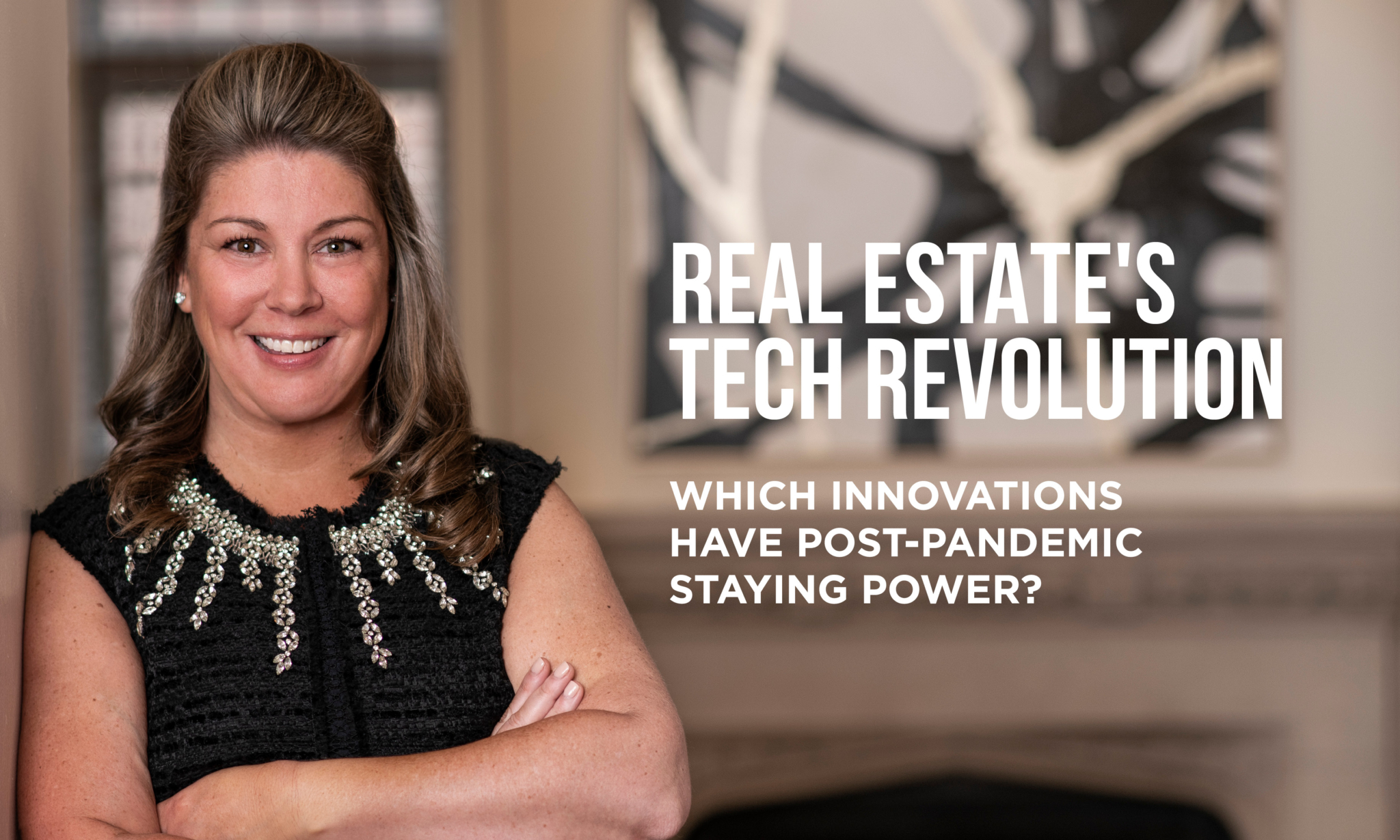As we all slowly begin to navigate the post-pandemic world, we continue to grapple with the many changes that have emerged over the past year and half. Just about every industry was affected, and real estate was no exception. Personal meetings were replaced by video meetings and teleconferencing, the handshake became an elbow rub and virtual open houses often resulted in buyers’ purchasing properties sight unseen.
While masks and social distance requirements may eventually fall by the wayside, much of the new real estate technology that has surfaced during the pandemic is likely to stick around for the foreseeable future.
Tech hits a high note
Kelly Dunn Rynes, broker and senior manager of a real estate team with Berkshire Hathaway HomeServices Chicago, has come to rely on a myriad of new apps, websites and systems that have made life easier for brokers, buyers, sellers, photographers and even home inspectors. With 20 years in the real estate business, Rynes has seen many changes over the past two decades, but in the last year, she said, technology has seemed to hit a high note when it comes to real estate.
While videography of homes was a pre-COVID staple in some markets, it has become a “must,” particularly for high-end listings. “We have a lot more sophisticated editing now with music and special-text fonts to really enhance the video,” explained Rynes. “Clients also like to have access to these videos so they can share on their social media platforms.”
Rynes typically offers complimentary photography and videography services for her clients, as well as “soft staging,” such as changing out towels or adding new bedspreads or fresh flowers. For those requiring “hard staging,” like bringing in furniture, she’ll connect her sellers with one of her home-staging vendors.
The tight market and historically low inventory nationwide have led to the proliferation of new websites and apps like Remine, Zenlist, Homesnap and others. “For instance, Remine can show you if a homeowner has refinanced in last few years. If they haven’t, and with interest rates now at an all-time low, they might be thinking about selling,” said Rynes.
Remine has also partnered with a number of MLSs across the nation, including Midwest Real Estate Data (MRED). Among many other perks, the technology allows MLSs to customize listing fields for their market areas and lets brokers submit listings via desktop or mobile devices.
By using the Zenlist app, homebuyers can actually gain access to private listings to see what’s up-and-coming on the market. “This gives them the advantage of really being prepared so they can jump on a property right away,” added Rynes. Zenlist combines active listings with both the private and premarket listings, giving potential buyers the same information usually reserved only for real estate agents.
Homesnap, meantime, provides buyers with a national home-search portal with the same real-time MLS information available to agents. The free app offers detailed listings with high-definition photos, property history and unique features like searching within a school zone. “Another great highlight is being able to show the buyer where the property ends, since the app also provides accurate lot lines,” said Rynes.
On the other end, to help sellers with finding the right buyer for luxury properties, WealthEngine is a subscription app that supplies contact information for potential high-end buyers. Searches can be conducted using a variety of factors, such as geography or income. “Instead of just hoping for a buyer by throwing it out to the masses, this app lets you drill down and identify possible luxury homebuyers,” explained Rynes. “It helps you to be proactive about it, and even if they’re not currently in the market, they could be in the future. It’s a great way to make new connections.”
Rynes also uses the FOREWARN app, which helps to positively identify over 80% of prospective buyers. The app can verify current property and vehicle ownership, financial risks and any criminal records.
Tech as an amenity
In addition to adopting new real estate apps, Rynes has had to learn to manage smart-home systems for her ultra-luxury listings, many of which are located on the North Shore. These high-end listings more frequently feature wall-unit mini-computers that control everything from lights and security cameras to HVAC and music. “I find that I have to arrive about 20 minutes early to a showing just to get things set up properly,” she said. “It’s definitely a new skill set I’ve had to learn — it’s literally like, ‘lights, camera, action,’ especially when I have to launch a movie in their theater rooms.”
Her clients also need to feel comfortable giving Rynes access to their security codes. “Now when smart homes sell, the new thing we’re seeing is the involvement of an A/V professional in order to transfer service and change out codes,” she added. “It’s not just about movers and decorators anymore.”
Sealing the deal
Even home inspectors are jumping on the technology bandwagon. “Instead of just taking photos, they’re starting to use drones to see every aspect of the rooms, as well as moisture meters to detect any water lurking behind the walls,” she said.
The closing table has also changed over the past year, and Rynes predicts the new lineup will likely become the norm moving forward. “I haven’t attended a closing in about 14 months,” she admitted. “There used to be over 10 people there, but now I don’t think there’s a need to have so many, as it’s been done successfully with just a few essential people.”
Rynes’ forecast for the future of real estate tech is pretty clear — she believes it’s all here to stay.
“All of this new technology has propelled our industry forward, and it’s also helped to remove the randomness of a wide net of marketing,” she said.
Launching during COVID

Caitlin Wright
Real estate newcomer Caitlin Wright of @properties’ St. Charles office agrees. She got into the business just a short time ago — actually the week before the “stay-at-home” order took place in Illinois last year. “I remember panicking that no one would buy homes, but it was just the opposite,” she recalled.
Like many parts of the county, large cities began to see a mass exodus as people fled to suburban or rural areas to secure more space and safety from the pandemic. Wright works with her mother, who has been in the business for 16 years. “For me, it was dealing with a lot of first-time homebuyers coming out of the city, so I depended on virtual showings, 3D tours, floor plans and a lot of social media,” Wright said. “Zenlist was also huge for us because it allowed clients to dive deeper than just using the MLS. In fact, I’ve seen a lot of ‘contingents’ on homes even before they hit the MLS.”
Wright relies heavily on social media for lead generation, gaining about 90% of her leads from Instagram and LinkedIn. “You have to be consistent and get yourself out there,” she said. “It’ s a great way to showcase properties, plus give something of value like market updates or homeowner tips.”
Even with the pandemic turning a corner, she still plans on utilizing digital presentations prior to meeting with potential clients. “I can create and send these to prospective buyers and sellers, and I think the younger generation really prefers this,” she said.
Like Rynes, Wright sees similar tech trends, with homeowners installing smart-home systems and inspectors using drones and scanners to view chimneys and other parts of the house that are sometimes difficult to access.
Social media a must
 A broker for over three years with Dream Town in Edison Park, Abby Powell is also a fan of new technology to help buyers of all ages find their homes. Zenlist, social media, 3D tours and floor plans are a part of her real estate arsenal, as well. “Programs like Matterport not only allow a prospective buyer to virtually ‘tour’ a home, but they also provide wall-to-wall measurements, which is important for people who want to bring a lot of their current furniture,” she said. “I’ll definitely continue to use this — it gives people an edge to be better prepared for when they actually see the home in person.”
A broker for over three years with Dream Town in Edison Park, Abby Powell is also a fan of new technology to help buyers of all ages find their homes. Zenlist, social media, 3D tours and floor plans are a part of her real estate arsenal, as well. “Programs like Matterport not only allow a prospective buyer to virtually ‘tour’ a home, but they also provide wall-to-wall measurements, which is important for people who want to bring a lot of their current furniture,” she said. “I’ll definitely continue to use this — it gives people an edge to be better prepared for when they actually see the home in person.”
Her go-to social media platforms include Instagram, Facebook, LinkedIn and TikTok, which allows a maximum of just one-minute videos. “Because of the limited amount of time, I can do my ‘elevator pitch’ on there, create an interest and provide a direct link to a virtual tour of the property,” she explained. “It’s also important to engage the right type of hashtags so people can follow them.”
Zoom, FaceTime and other teleconferencing tech will continue to be part of Powell’s routine. “For now, it’s still about staying safe and healthy, but post-pandemic, I think these tools will continue to be essential for a lot of people who have become very tech-savvy during this time.”
Most importantly, Powell encourages her followers on all platforms to share content so she can continue to grow her social media presence. “You know the old saying, ‘Your net worth is only as big as your network,’” she quipped.
